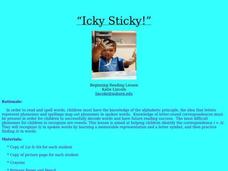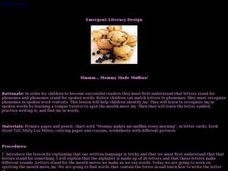Curated OER
Aches and Pains
Being able to distinguish between short and long vowel /a/ sounds is an important skill for young readers. They are introduced to the vowel-consonant-e pattern that changes short vowel sounds into long vowel sounds. They practice reading...
Curated OER
Iggy the Penguin
Take your young word detectives on a hunt for the /i/ sound. Use the tongue twister about Iggy the penguin to help learners identify the target sound. Then learners are given several words, and they have to use their detective skills to...
Curated OER
Hard C and Soft C
Learners categorize different words that contain a hard c and a soft c. In this hard and soft c lesson plan, students also pick words from each of the categories and write a story with those words.
Curated OER
Unknown Numbers in Sums and Differences
Your new mathematicians may think word problems sound scary, but this introductory set of scenarios will leave them feeling accomplished in their addition and subtraction skills! Learners read seven word problems, each requiring them to...
Curated OER
Jack the Fat Cat
Students recognize the short /a/ sound in written and spoken words in this lesson. They say a tongue twister which emphasizes words with the short /a/ sound. They then listen to the story "A Cat Nap" and identify the words in the story...
Curated OER
Icky Sticky
Young scholars recognize the short vowel i in written and spoken language. Through matching and listening activities, they discriminate the vowel sound /i/ from other phonemes. Students identify the phoneme and letter in words and pictures.
Curated OER
Beginning Reading Lesson: Aaa-aaa-aaa-choo!!
Pupils study the letter sound recognition for the /a/ by recognizing the sound one makes when they sneeze. They use a chart with a tongue twister on it and work with letterboxes and manipulative letters that focus on words with the /a/....
Curated OER
Baby Brown Bears
Students identify the letter and phoneme /b/ in written and spoken language. Students practice the production of the /b/ sound through riddles and tongue twisters. They identify the initial placement of the letter and sound using a...
Curated OER
"Open Your Mouth and Say AH!"
Students practice letter and sound recognition of the vowel o=/o/. They study the tongue twister "Tom got a frog from the pond" and the book, "If You Give a Moose a Muffin," by Laura Joffe Numeroff with an accompanying worksheet to master.
Curated OER
Can You Open the Creaky Door?
Young scholars recognize the short vowel e in written and spoken language. Through matching and listening activities, they discriminate the vowel sound /e/ from other phonemes. Students identify the phoneme and letter in words and pictures.
Curated OER
Mmmm...Mommy Made Muffins!
Learners explore phonemes. They explore phonemes in spoken word contexts. Students discuss the phoneme /m/. They learn a tongue twister to help them recognize /m/. Learners read "Stand Tall, Molly Lou Melon and identify the phoneme /m/...
Curated OER
Toot & Puddle: Puddle's ABC Lesson Plan
Students familiarize themselves with the sounds of the alphabet by creating an alphabet book. In this early childhood language arts lesson plan, students identify uppercase and lowercase letters, recognize sounds, and review the order of...
Curated OER
Icky Sticky Mess
Students practice sounding out and writing the letter "i." They listen for the "i" sound in phrases the teacher says. The students then practice writing the upper and lower case letter "i." Finally, they listen to the book "Liz is...
Curated OER
Open Wide and Say Ahh
Students recognize the short vowel o in written and spoken language. Through matching and listening activities, they discriminate the vowel sound /o/ from other phonemes. Students identify the phoneme and letter in words and pictures.
Curated OER
What Did You Say?
Students recognize the short vowel E in written and spoken language. Through matching activities, they discriminate the short vowel /e/ from other phonemes. Students associate the phoneme with its letter representation and read pseudo...
Curated OER
Shhhhelly Shhhhrimp
Students read and spell words via alphabetic insight that letters stand for phonemes and spelling. They map out the phonemes in spoken words. This instructional activity will help students identify the letters s and h, along with the...
British Council
Alphabet
Here's a packet filled with suggestions and activities for teaching the alphabet.
Florida Center for Reading Research
Advanced Phonics: Syllable Patterns, Syllable Game
A game designed to support advanced phonics instruction challenges scholars to read and break a word into syllables. If the player is correct, they move their game piece forward on the board. Whoever gets to the end first wins!
Curated OER
Winter Syllables pg. 1
It's winter! Bring the winter theme into your classroom with a syllable worksheet. Scholars identify the winter picture, clap the number of syllables in the word, and then write in the matching number of syllables for the word. There are...
Kelly's Kindergarten
June Daily Activities
This is an absolute must-have resource for early elementary teachers! Here you'll find a collection of activities and worksheets for each day of the month of June, with topics ranging from ordering numbers on a calendar or identifying...
Curated OER
Aaaaaaaaaa!!! You Scared Me!
Students practice the letter A sound in its different foms. They study a tongue twister that encompasses the letter A sounds. They use letterboxes and bags of letters to sound out different words with the a sound. They listen to a...
Curated OER
Open Wide
Students practice letter(s) map(s) along with phoneme sequences and sounds that make the /o/ sound in both spoken and written formats. They also decode words containing /o/ sounds to work towards becoming more fluent readers beginning...
Curated OER
Iiizzy is Iiicky Sticky!
Young scholars answer a series of questions about the different sounds that the letter I makes. They observe a picture about a girl and the letter I. They practice a tongue twister with the different sounds of I. They practice writing...
Curated OER
Icky "I"
Learners recognize the short vowel i in written and spoken language. Through matching activities, they discriminate the short vowel /i/ from other vowel sounds. Students associate the phoneme with its letter representation and identify...

























